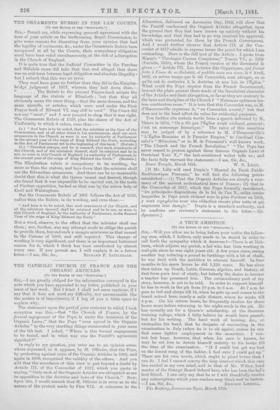THE CATHOLIC CHURCH IN FRANCE AND THE • ORGANIC ARTICLES.
[TO THE EDITOR OF THE " SPECTATOR.") am greatly obliged for the information conveyed in the note which you have appended to my letter, published in your issue of last week. But I trust I shall not seem captious, if I say that it does not meet my difficulty, nor unreasonable (for the matter is of importance), if I beg of you a little space to explain why.
The statement upon the part of your reviewer to which I took exception was this,—that " the Church of France, by the formal engagement of the Pope, is under the dominion of the Organic Laws ;" that the Pope "even agreed in the Organic Articles" to the very startling things enumerated in your issue of the 5th inst. I asked, " Where is this formal engagement to be found, and in what way was the Pontiff's agreement signified P" In reply to my question, you refer me to an opinion some- where expressed, as it appears, by M. 011ivier, that the Pope, by protesting against some of the Organic Articles in 1802, and again in 1809, recognised the validity of the others. And you add that the soundness of this view is put beyond a doubt by Article III. of the Concordat of 1817, which you quote in saying, " Only such of the Organic Articles are abrogated. as are in opposition to the doctrine and laws of the Church." Now, upon this, I would remark that M. 011ivier is in error as to the nature of the protest made by Pius VII. A reference to the Allocution, delivered on Ascension Day, 1802, will show that the Pontiff condemned the Organic Articles altogether, upon the ground that they had been drawn up entirely without his knowledge, and that they had in no way received his approval, which was pretended for them by the French Government. And I would further observe that Article III. of the Con- cordat of 1817 admits in express terms the point for which I aim contending. Here is the full text of the Article : I quote from, Migne's "Theologise Cursus Completes," Tomas VI., p. 1209. (Pariahs, 1839), where the French version of the document is. given :—" Article III. Les Articles dits Organiques, qui furent faits cl l'insn de sa Saintete, et publigs sans son aveu, le 8 Avril, 1802, en //Arne temps que le dit Concordat, sont abrog6s, en ce. qu'ils out de contraire k la doctrine et aux lois de l'Lglise."• What could the Pope require from the French Government,. beyond the plain avowal there made of the fraudulent character of the Articles and their abrogation, so far as they are contrary to the laws and discipline of the Church P " Habemus optimum tea tern confitentem reum." It is true that this Concordat was, as M. d'Haussonville expresses it, " un Concordat avort6;" but that does not in the least affect its value for evidential purposes.
You further cite certain words from a speech delivered by M. 'Driers in 1854, " On a dit que l'Eglise avait r6clame, proteste ;. cost un Meesonge historique." The value of this assertion may be judged of by a reference to M. d'Haussonville's " L'Eglise Romaine et le Premier Empire," to Cardinal Con- salvi's M6moires," or to M. de Pressense's well-known work,. "The Church and the French Revolution." "The Pope has never ceased to protest against these famous Organic Laws of Germinal Year X.," the last-mentioned writer tells us ; and the facts fully warrant the statement.—I am, Sir, &c., [If Mr. Lilly will read Dupin's "Manuel du Droit Public Eccl6siastique Francais," he will find the following points established :—(1) That the Organic Articles are simply a sum- mary of the ancient ecclesiastical laws of France ; (2) that in the Concordat of 1817, which the Popo formally sanctioned„. "les principales dispositions de la, loi de l'au X., cellos contre- lesquelles le Pape avait r6clame avec le plus d'ardeur en 1804, y sent reprqduites avec nue r6daction encore plus nette et qui augmente lour 6nergie." Dupin is a standard authority, and he confirms our reviewer's statement to the letter.—En.. Spectator.]


































 Previous page
Previous page